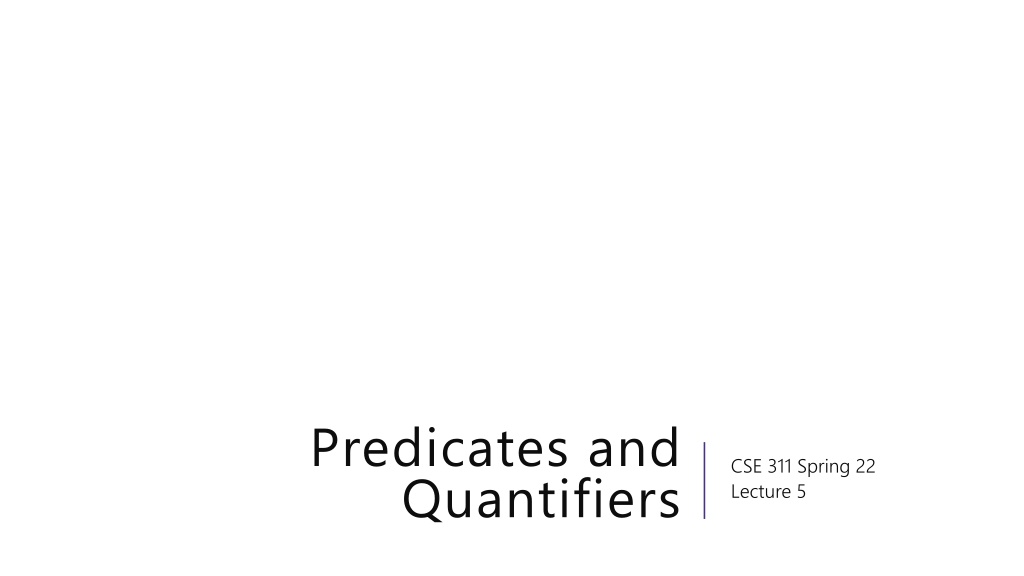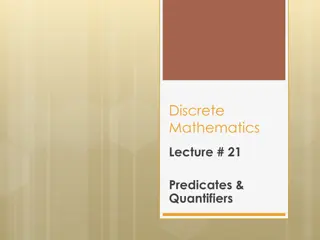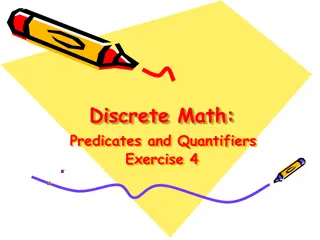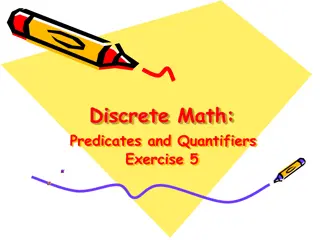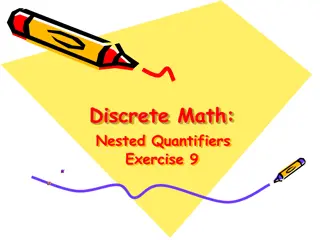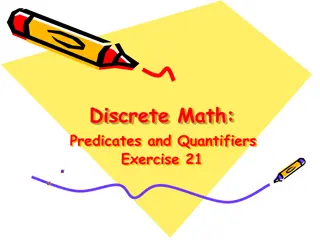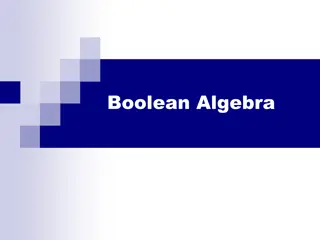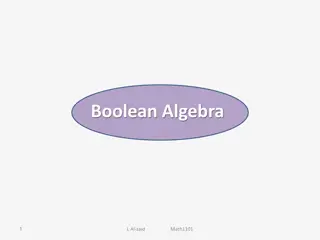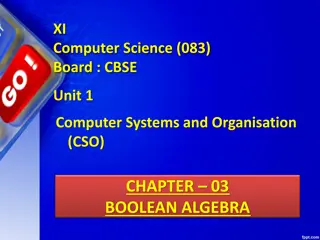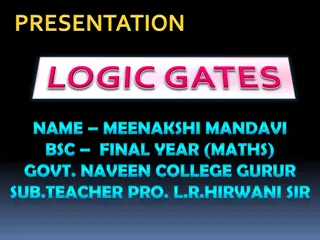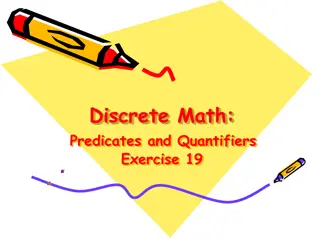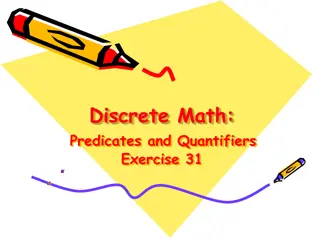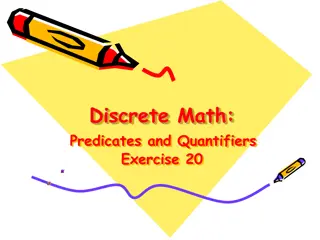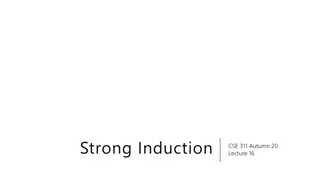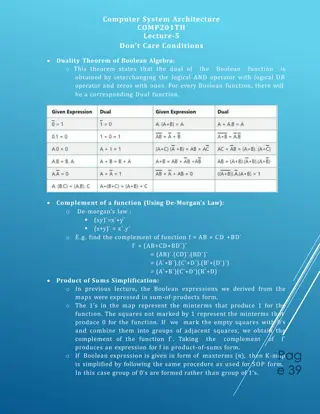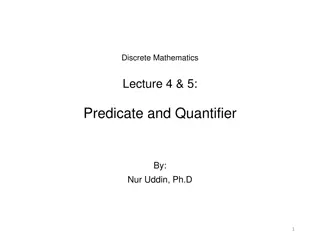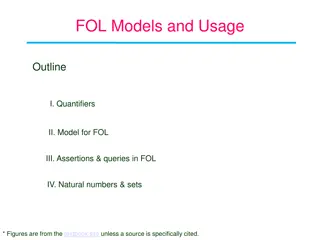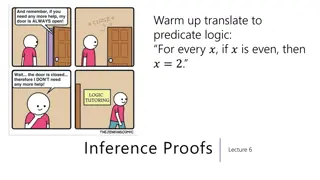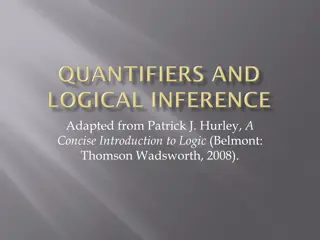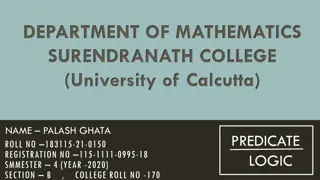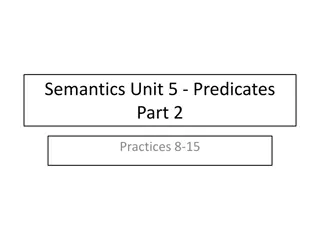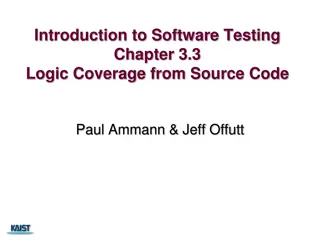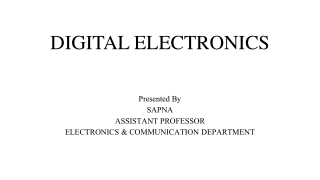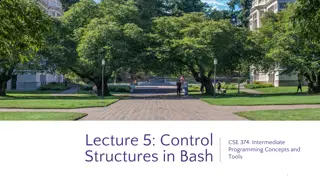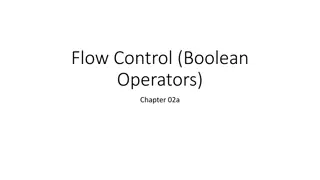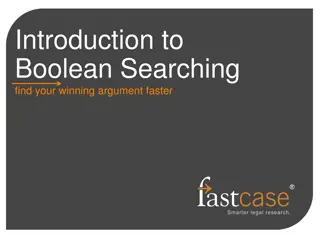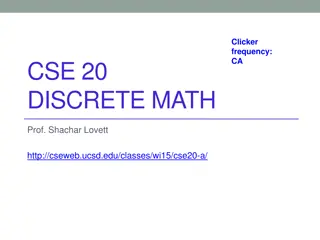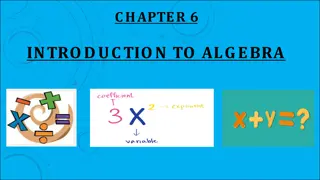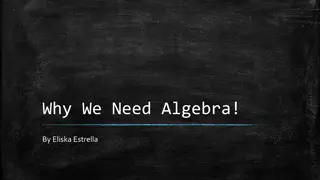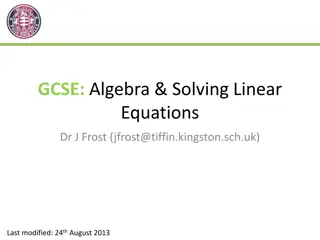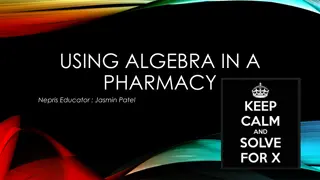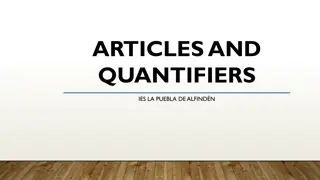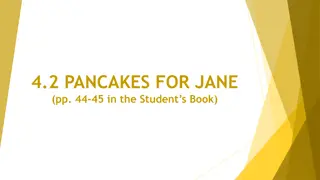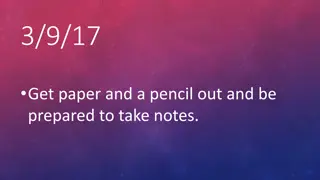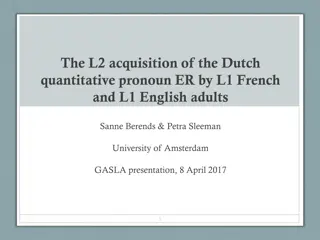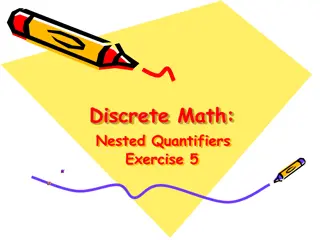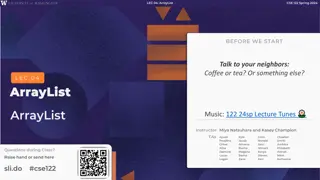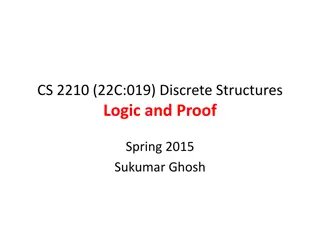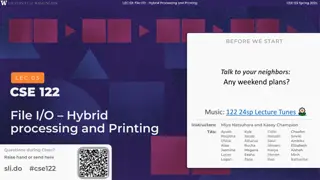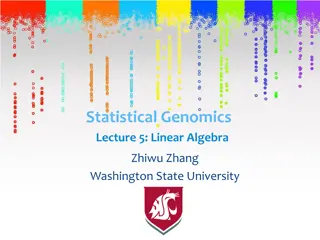Understanding Boolean Algebra: Predicates and Quantifiers in CSE 311 Spring '22 Lecture 5
Dive into the world of Boolean Algebra with this comprehensive guide that explores the fundamentals of predicates, quantifiers, and their applications in computer science and circuit design. Discover the concepts behind Boolean variables, logical operations, and equivalence in Propositional Logic. Explore the compact notation preferred by mathematicians and circuit designers, uncovering the relationships between Boolean expressions and traditional mathematical operations like addition and multiplication. Learn to manipulate and compare Boolean expressions, understanding how different notations can represent the same underlying ideas. Gain insights into the core principles of Boolean Algebra and its significance in various fields of study.
Download Presentation

Please find below an Image/Link to download the presentation.
The content on the website is provided AS IS for your information and personal use only. It may not be sold, licensed, or shared on other websites without obtaining consent from the author. Download presentation by click this link. If you encounter any issues during the download, it is possible that the publisher has removed the file from their server.
E N D
Presentation Transcript
Predicates and Quantifiers CSE 311 Spring 22 Lecture 5
Announcements HW1 is due tonight at 10PM It takes a few minutes to upload to gradescope! You need to select the pages on your submission. Check this afternoon to make sure you re on gradescope if you haven t done that yet. at 10PM If something goes wrong at 9:59, I will not see the email until tomorrow (neither will your TAs). If you have issues, send me your pdf via email and what happened and we ll deal with it in the morning.
Announcements Sections AA and AD meet in different locations starting this week That s one of the 11:30 and 12:30 sections. Correct locations on Ed (or on the time schedule) this week.
Meet Boolean Algebra Preferred by some mathematicians and circuit designers. or is + and is (i.e. multiply ) not is (an apostrophe after a variable) Why? Mathematicians like to study operations that work kinda like plus and times on integers. Circuit designers have a lot of variables, and this notation is more compact.
Meet Boolean Algebra Name Variables boolean b True/False true,false And Or Not ! Implication && || Java Code No special symbol T, F Propositional Logic "?,?,?" Circuits Wires 1, 0 No special symbol Boolean Algebra 1,0 No special symbol ?,?,? + ( multiplication ) ( addition ) (apostrophe after variable) Propositional logic Boolean Algebra ? ? ? ? ? ??? + ? + ?
Comparison Propositional logic Boolean Algebra ? ? ? ? ? ??? + ? + ? Remember this is just an alternate notation for the same underlying ideas. So that big list of identities? Just change the notation and you get another big list of identities! Sometimes names are different ( involution instead of double negation ), but the core ideas are the same.
A Few Fun Facts That you re not responsible for: The identities are divided into axioms and theorems Mathematicians (and some computer scientists, like me ) will sometimes study what minimum starting points ( the axioms ) will be enough to derive all the usual facts we rely on ( the theorems ) That s what I meant by operations that work kinda like plus and times For our purposes, we won t make a distinction here, but we will use similar thinking later in the course. Boolean algebra makes things like commutativity axioms (starting points, things we assume) with propositional logic, we start from the truth tables and can derive that commutativity is true. For this class, though, it s a fact you can use either way.
Why ANOTHER way of writing down logic? This is the third one!? Because, in your future courses, you ll use any/all of them. Remember there aren t new concepts here, just new representations. We mostly use propositional notation ( , , ,etc.) but we ll use them all a bit so you re ready for any of them in your future courses. Practice in section and on homework.
Predicate Logic So far our propositions have worked great for fixed objects. What if we want to say If ? > 10 then ?2> 100. ? > 10isn t a proposition. Its truth value depends on ?. We need a function that can take in a value for ? and output True or False as appropriate.
Predicates Predicate A function that outputs true or false. Cat(x):= x is a cat Prime(x):= xis prime LessThan(x,y):= x<y Sum(x,y,z):= x+y=z HasNChars(s,n):= string s has length n Numbers and types of inputs can change. Only requirement is output is Boolean.
Analogy Propositions were like Boolean variables. What are predicates? Functions that return Booleans public boolean predicate( )
Translation Translation works a lot like when we just had propositions. Let s try it ? is prime or ?2 is odd or ? = 2. Prime ? Odd ?2 Equals ?,2
Domain of Discourse ? is prime or ?2 is odd or ? = 2. Prime ? Odd ?2 Equals ?,2 Can ?be 4.5? What about abc ? I never intended you to plug 4.5 or abc into ?. When you read the sentence you probably didn t imagine plugging those values in .
Domain of Discourse ? is prime or ?2 is odd or ? = 2. Prime ? Odd ?2 Equals ?,2 To make sure we can t deciding on the types we ll allow can t plug in 4.5 for ?, predicate logic requires Domain of Discourse The typesof inputs allowed in our predicates.
Try it What s a possible domain of discourse for these lists of predicates? 1. ?is a cat , ?barks , ?likes to take walks 2. ?is prime , ?=5 ? < 20 ?is a power of two 3. ? is enrolled in course ? , ? is a pre-req for ?"
Try it What s a possible domain of discourse for these lists of predicates? 1. ?is a cat , ?barks , ?likes to take walks Mammals , pets , dogs and cats , 2. ?is prime , ?=5 ? < 20 ?is a power of two positive integers , integers , numbers , 3. ? is enrolled in course ? , ? is a pre-req for ?" objects in the university course enrollment system , university entities , students and courses , More than one domain of discourse might be reasonable if it might affect the meaning of the statement, we specify it.
Quantifiers Now that we have variables, let s really use them We tend to use variables for two reasons: 1. The statement is true for every ?, we just want to put a name on it. 2. There s some ? out there that works, (but I might not know which it is, so I m using a variable).
Quantifiers We have two extra symbols to indicate which way we re using the variable. 1. The statement is true for every ?, we just want to put a name on it. ? (p x ? ? )means for every ? in our domain, ?(?) and ?(?) both evaluate to true. 2. There s some ? out there that works, (but I might not know which it is, so I m using a variable). ?(? ? ? ? )means there is an ? in our domain, such that ?(?) and ? ? are both true.
Quantifiers We have two extra symbols to indicate which way we re using the variable. 1. The statement is true for every ?, we just want to put a name on it. ? (p x ? ? )means for every ? in our domain, ?(?) and ?(?) both evaluate to true. 2. There s some ? out there that works, (but I might not know which it is, so I m using a variable). ?(? ? ? ? )means there is an ? in our domain, ?(?) and ? ? are both true. for each ? , for every ? , for all ? are common translations Remember: upside-down-A for All. Universal Quantifier ?
Quantifiers We have two extra symbols to indicate which way we re using the variable. 1. The statement is true for every ?, we just want to put a name on it. ? (p x ? ? )means for every ? in our domain, ?(?) and ?(?) both evaluate to true. 2. There s some ? out there that works, (but I might not know which it is, so I m using a variable). ?(? ? ? ? )means there is an ? in our domain, for which ?(?) and ? ? are both true. Existential Quantifier ? there is an ? , there exists an ? , for some ? are common translations Remember: backwards-E for Exists.
Translations For every ?, if ? is even, then ? = 2. There are x,? such that x < ?. ? (Odd ? LessThan ?,5 ) ? (Even ? Odd ? ) pollev.com/uwcse311 Help me adjust my explanation!
Translations For every ?, if ? is even, then ? = 2. ?(Even ? Equal ?,2 ) There are x,? such that x < ?. ? ?(LessThan ?,? ) ? (Odd ? LessThan ?,5 ) There is an odd number that is less than 5. ? (Even ? Odd ? ) All numbers are both even and odd.
Translations More practice in section and on homework. Also a reading on the webpage An explanation of why for any is not a great way to translate (even though it looks like a good option on the surface) More information on what happens with multiple quantifiers (we ll discuss more on Friday or Monday).
Evaluating Predicate Logic For every ?, if ? is even, then ? = 2. / ?(Even ? Equal ?,2 ) Is this true?
Evaluating Predicate Logic For every ?, if ? is even, then ? = 2. / ?(Even ? Equal ?,2 ) Is this true? TRICK QUESTION! It depends on the domain. Prime Numbers Positive Integers Odd integers True False True (vacuously)
One Technical Matter How do we parse sentences with quantifiers? What s the order of operations? We will usually put parentheses right after the quantifier and variable to make it clear what s included. If we don t, it s the rest of the expression. Be careful with repeated variables they don t always mean what you think they mean. ?(? ? ) are different ? s. ? ? ?
Bound Variables What happens if we repeat a variable? Whenever you introduce a new quantifier with an already existing variable, it takes over that name until its expression ends. ?(? ? ? ? ? ? ? ) It s common (albeit somewhat confusing) practice to reuse a variables when it wouldn t matter . Never do something like the above: where a single name switches from gold to purple back to gold. Switching from gold to purple only is usually fine but names are cheap.
More Practice Let your domain of discourse be fruits. Translate these There is a fruit that is tasty and ripe. For every fruit, if it is not ripe then it is not tasty. There is a fruit that is sliced and diced.
More Practice Let your domain of discourse be fruits. Translate these There is a fruit that is tasty and ripe. ?(Tasty ? Ripe ? ) For every fruit, if it is not ripe then it is not tasty. ?( Ripe ? Tasty ? ) There is a fruit that is sliced and diced. ?(Sliced ? Diced ? )
Inference Proofs A new way of thinking of proofs: Here s one way to get an iron-clad guarantee: 1. Write down all the facts we know. 2. Combine the things we know to derive new facts. 3. Continue until what we want to show is a fact.
Drawing Conclusions You know If it is raining, then I have my umbrella And It is raining You should conclude . I have my umbrella! For whatever you conclude, convert the statement to propositional logic will your statement hold for any propositions, or is it specific to raining and umbrellas? I know (? ?) and ?, I can conclude ? Or said another way: ? ? ? ?
Modus Ponens The inference from the last slide is always valid. I.e. ? ? ? ? T
Modus Ponens a formal proof ? ? ? ? [ ? ? ?] ? ? ? ? F ? ? ? ? ? ? ? ? [ ? ?] ? [? ?] ? T T Law of Implication Commutativity Distributivity Negation Commutativity Identity Law of Implication DeMorgan s Law Associativity Commutativity Negation Domination ? ? ? ? ? ? ? ? ? F ? ? ? ? ?
Modus Ponens The inference from the last slide is always valid. I.e. ? ? ? ? T We use that inference A LOT So often people gave it a name ( Modus Ponens ) So often we don t have time to repeat that 12 line proof EVERY TIME. Let s make this another law we can apply in a single step. Just like refactoring a method in code.
Notation Laws of Inference We re using the symbol A LOT. Too much Some new notation to make our lives easier. If we know both both ? and ? ?,? We can conclude any (or all) of ?,? ?,? means therefore I knew ?,? therefore I can conclude ?,?. ? ?,? Modus Ponens, i.e. ? ? ? ?), in our new notation. ?
Another Proof Let s keep going. I know If it is raining then I have my umbrella and I do not have my umbrella I can conclude It is not raining! What s the general form? How do you think the proof will go? If you had to convince a friend of this claim in English, how would you do it? [(? ?) ?] ?
A proof! We know ? ? and ?; we want to conclude ?. Let s try to prove it. Our goal is to list facts until our goal becomes a fact. We ll number our facts, and put a justification for each new one.
A proof! We know ? ? and ?; we want to conclude ?. Let s try to prove it. Our goal is to list facts until our goal becomes a fact. We ll number our facts, and put a justification for each new one. Given Given Contrapositive of 1. Modus Ponens on 3,2. 1. ? ? 2. ? 3. ? ? 4. ?
Try it yourselves Suppose you know ? ?, ? ?,and ?. Give an argument to conclude ?. Pollev.com/uwcse311 Help me adjust my explanation!
Try it yourselves Suppose you know ? ?, ? ?,and ?. Give an argument to conclude ?. Given Given Given Modus Ponens 1,3 Contrapositive of 2 Modus Ponens 5,4 1. ? ? 2. ? ? 3. ? 4. ? 5. ? ? 6. ?
More Inference Rules We need a couple more inference rules. These rules set us up to get facts in exactly the right form to apply the really useful rules. A lot like commutativity and associativity in the propositional logic rules. I know the fact ? ? ? ? Eliminate I can conclude ? is a fact and ? is a fact separately separately. ?,?
More Inference Rules In total, we have two for and two for , one to create the connector, and one to remove it. ? ? Eliminate ?,? Intro ? ? ?,? ? ? ?, ? Intro Eliminate ? ?,? ? ? None of these rules are surprising, but they are useful.
The Direct Proof Rule We ve been implicitly using another rule today, the direct proof rule Write a proof given ? conclude ? ? ? Direct Proof rule ? ? ? ? This rule is different from the others ? ?is not a single fact. It s an observation that we ve done a proof. (i.e. that we showed fact ? starting from ?.) We will get a lot of mileage out of this rule starting next time.
Caution Be careful! Logical inference rules can only be applied to entire They cannot be applied to portions of a statement (the way our propositional rules could). Why not? Suppose we know ? ?, ?. Can we conclude ?? Given Given Introduce (1) Introduce (2) Modus Ponens 3,4. entire facts. 1. ? ? ? Intro 2. ? ? ?,? ? 3. ? ? ? 4. ? ? 5. ?
One more Proof Show if we know: ?,?, ? ? ? ? ,? ? we can conclude ?.
